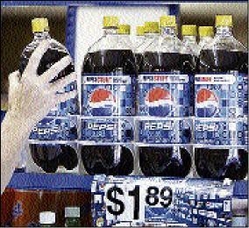PepsiCo offers to buy shares in two bottlers for US$6b
Published: Tuesday | April 21, 2009

In this April 21, 2008 file photo, a customer takes a bottle of Pepsi from a display at T&P Grocery in Hosford, Florida. Beverage and snack maker PepsiCo Inc yesterday offered to acquire its two largest bottlers - Pepsi Bottling Group and PepsiAmericas - for US$6 billion in an effort to cut costs and become more efficient. - AP
PepsiCo Inc, the maker of drinks like Mountain Dew and its namesake soda, offered US$6 billion yesterday to acquire a bigger stake in its two largest bottlers in an effort to update the way it delivers its products.
It also reported a one per cent drop in first-quarter profit.
The company, which makes Gatorade, Aquafina and snacks like Lay's and Fritos chips, will handle about 80 per cent of its total North American beverage volume if the deals for Pepsi Bottling Group and PepsiAmericas go through.
"There is a need to be more nimble given the increasing role of (non-carbonated beverages), retailer consolidation and the changing competitive landscape," PepsiCo Chairman and Chief Executive Indra Nooyi said.
Landscape change
PepsiCo currently owns 33 per cent of Somers, New York-based Pepsi Bottling Group and 43 per cent of PepsiAmericas, which is based in Minneapolis.
The move shows how much the landscape has changed since 1999, when PepsiCo spun off Pepsi Bottling Group.
Since then, soft drink sales have dropped and Pepsi bought Tropicana, Gatorade and other non-carbonated beverages.
"A move this big changes the entire landscape of the industry," said John Sicher, editor of the trade publication Beverage Digest.
"The spin-off happened in a day when the business was mainly carbonated soft drinks.

Indra Nooyi
Today the beverage business consists of a greater diversity of products, and PepsiCo needs more control and flexibility over the route to market for its brands."
In short, the move allows Pepsi more direction over its products, since it will not have to negotiate with bottlers about what items are distributed.
However, Pepsi will have a larger stake in the more volatile bottler business, which is affected by packaging and other costs.
"PepsiCo will now be able to decide how many varieties of smaller non-carbonated products go through the distribution system and eventually end up on retailer shelves," Sicher said.
Although ultimately the decision of what goes on store shelves lies with the retailers, in the past Pepsi had to negotiate with bottlers, which controlled distribution, and persuade them to include smaller offerings in their network.
"We can now incubate new products that start out small in one distribution system and switch it to another with little friction," Nooyi said.
Analysts speculated that Coca-Cola Co, the world's largest soft drink maker, may follow suit since it faces the same challenges as Pepsi.
"We would expect Coke to follow," said Deutsche Bank analyst Marc Greenberg. "But the longer it waits ... the more it may cost: Advantage Pepsi."
Coca-Cola declined to comment.
Shares in PepsiCo fell US$2.07, or four per cent, to US$50.05 in midday trading.
Pepsi Bottling Group shares jumped US$5.25, or 21 per cent, to US$30.45, while PepsiAmericas shares rose US$4.36, or nearly 22 per cent, to US$24.24.
In contrast, most of the rest of the market sank, with the Dow Jones Industrial average down more than 200 points at midday.
PepsiCo expects the deal to help earnings by 15 cents per share annually and save US$200 per year before taxes. Analysts say that number is conservative and the savings could be as much as US$400 million.
PepsiCo, which is based in Purchase, New York, offered cash and stock worth 17 per cent more than each stock's closing price on Friday for the shares of the two bottlers it doesn't already own.
That equates to US$29.50 per for share for the Pepsi Bottling Group and US$23.27 per share for PepsiAmericas. Both bottlers are evaluating the offer.
PepsiCo Chief Financial Officer Richard Goodman did not give a timeline for changes since the deal has not gone through.
But he said ultimately the restructuring will mean consumers will be able to find more of the company's smaller drink offerings in more places
- AP















